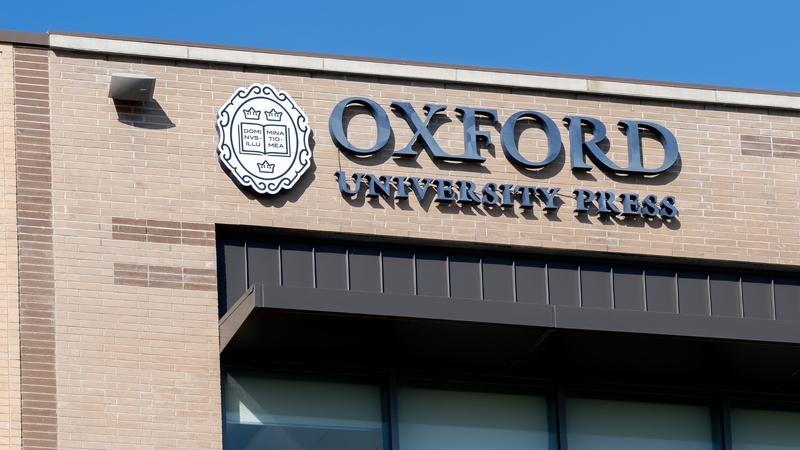You are viewing your 1 free article this month. Login to read more articles.
University presses launch new initiatives to reach readers with ‘experts’ in vogue
The boom in "smart non-fiction" has been a boon to university presses, with several publishers investing in new or ramped-up trade crossover lists. Yet while the sector’s traditional customer base is experiencing shifts—some of which are "enormous"—presses must continue to balance this with the values of the institutions they serve.
Cork University Press recently launched trade-focused series MindYourself, a peer-reviewed self-care list that will release three books a year, and a new series exploring how people are engaging with the ecological emergency in Ireland, called Earth Writing. Bristol University Press has new lists emerging around pressing global social challenges, including climate change and sustainable jobs, which it is developing a range of free content for. Manchester University Press is also launching a new trade list in 2020, while Yale University Press London is reshaping its Art list to make it more current and address a new generation of readers.
Several university presses believe that the rise in demand for "smart non-fiction" has been driven by a turbulent political landscape and other far-reaching hot-button issues. Ben Denne, director of publishing, books at Cambridge University Press, says the launch of its academic trade programme in 2018 was "in part a reaction to the recent boom in contemporary non-fiction and the demand for intelligent books that help us make sense of a fast-moving and fast-changing world".
Alison Shaw, c.e.o. of Bristol UP, whose Big Ideas list is home to trade/academic crossover titles, believes that the current state of politics, the climate emergency and rise of social media have all contributed to a surge of interest in titles on the topics in the past few years. Likewise, Yale’s publisher and m.d. Heather McCallum thinks the increased audience for serious non-fiction is down to the fact that "in our 21st-century world of information and data overload, readers are looking for the authority, reliability and enduring quality that university presses offer through seriously researched work".
David Clark, managing director of Oxford University Press’ Academic division, says its Very Short Introduction volumes on British politics and international relations "should be on everyone’s reading lists at the moment", while titles such as Paul Corthorn’s Enoch Powell and Archie Brown’s The Human Factor will "resonate with anyone trying to understand the context and background to today’s political situation". He also predicts that upcoming OUP climate change titles Disaster by Choice by Ilan Kelman and Building a Resilient Tomorrow by Alice C Hill and Leonardo Martinez-Diaz will reach beyond the scholarly community.
Expanding audience
As the audiences for university presses expand, so do the ways in which they reach their customers. Mike Collins, publications director at Cork University Press, says that while its customer base has remained a steady mix of bookshops, libraries and academics, its trade/academic releases have seen its audience widen. For the promotion of its MindYourSelf series, it is working with selfcare organisations such as The Psychological Society of Ireland, as well as focusing more on promotion via social media channels. McCallum also says that Yale’s customer base remains "quite traditional" for the most part, however it is driving forward a number of initiatives to enable more direct contact with customers and readers—experimenting with new forms of publicity and extending its channels to market—and is specifically aspiring to commission books that will engage a new and more diverse readership. One way in which it is trying to open up its readership is through exploring different forms of digital access for art books through its Mellon-funded Art & Architecture Portal.
At OUP, there has been an "enormous shift" in the customer base for its dictionary publishing thanks to a growing demand for lexical content to power voice recognition, AI and machine translation. While this offers a "huge opportunity", it requires a fundamental change to how the press disseminates content, as it works increasingly closely with technology developers. OUP is also introducing the first online book content to its Oxford Academic platform, beginning to offer library customers new ways to purchase key series, and expanding its current portfolio of Read & Publish deals to help support the transition to Open Access publishing in journals.
Bristol’s endeavours to attract a wider audience include a new podcast series, video content and its Transforming Society blog. Its next area of focus to reach a broader customer base will be creating audiobooks for selected titles. Similarly, Cambridge UP is to begin producing its own audiobooks, starting with titles drawn from the trade programme. Denne says: "Audio is an increasingly popular and important way for people to enjoy books and we need to explore its potential."
Broadening the canon
Finding new ways to reach customers is just one way in which university presses are diversifying. They are also looking to broaden the make-up of their author rosters and employees. Liverpool is "firmly engaged in decolonising the curriculum", exemplified by its forthcoming translation of Michel-Rolph Trouillot’s history of the Haitian revolution written in Haitian Creole, Ti dife boule sou istwa Ayiti, and translations of work of Caribbean critic Édouard Glissant. Yale’s efforts to "shape a fresh 21st-century list and press" see its editors actively seeking new voices, alongside a number of initiatives to increase inclusivity among staff, such as changing its recruitment policies and approaches, undertaking unconscious bias training and plans to establish a specific internship.
Shaw says diversity and equality have been a “cornerstone” of Bristol UP since its inception. The organisation has an Equality, Diversity & Inclusion working group, as well as a "diverse" author base and content. Four out of five members of its senior management team are women and it is working with Creative Access to encourage applicants from diverse backgrounds. CUP also works with Creative Access, offering free accommodation and paid placements to interns from black, Asian and minority ethnic backgrounds. In addition, it is "working hard" to become more inclusive through its apprenticeship programme, LGBT+ and Disability and Neurodiversity colleague networks, and its contribution to the creation of the new Publishing Assistant Apprenticeship from the Publishers Association and LDN Apprenticeships.
Brexit uncertainty
Along with the move to become more inclusive, another challenge university presses are tackling is the uncertainty around Brexit. Like other publishers, academic and trade-facing, CUP has been preparing for Brexit and the "regulatory and economic upheaval" the UK leaving the EU without a deal could cause. This has included increasing extra stock and print-on-demand overseas to reduce the effect of delays at ports and airports. Denne says that while the move towards the world becoming less interconnected increases the risk for a global business like CUP, this is counterbalanced by "the huge global reach of the UK’s academic publishing and its reputation for quality, accuracy and authenticity". Nevertheless, he warns: "What we hear from people around the world underlines the challenges to the UK’s global reputation and the need for time and effort from the UK to address them."
McCallum anticipates that Brexit and the subsequent withdrawal of EU academic funding will impact on Yale’s commissioning, in addition to more immediate effects such as higher production costs for overseas suppliers, distorted sales patterns owing to stockpiling up, early reprinting of core backlist and personnel issues.
Liverpool University Press m.d. Anthony Cond says that the short-term impacts of Brexit for university presses are "no different to those for other publishers in terms of the movement of books and journals and supply chain challenges". In the longer-term, he believes that the impact on UK Higher Education institutions could be significant for international student and staff recruitment and retention, and access to European research funding and partnerships. Liverpool UP’s next international project sees it look outside Europe—it is about to launch the XJTLU imprint in partnership with Xi’an Jiaotong-Liverpool University in Suzhou, which will showcase humanities and social sciences from a distinctively Chinese angle and will include both books and journals.
Despite the difficulties facing it, Cond is positive about the UK’s "vibrant" university press scene and the "importance and distinctiveness" of its publishing.














